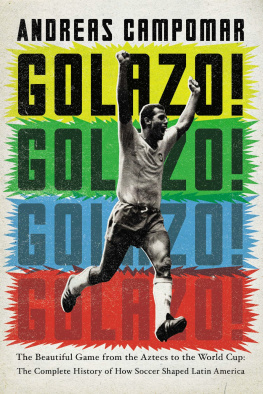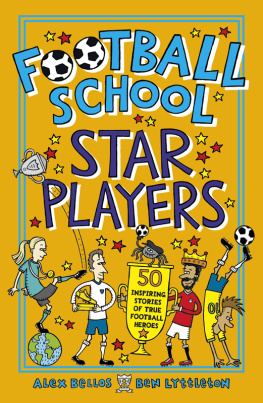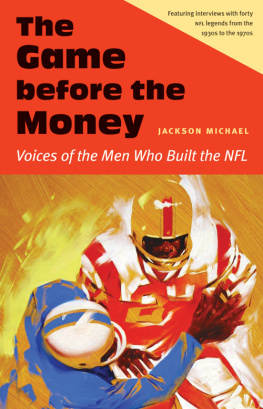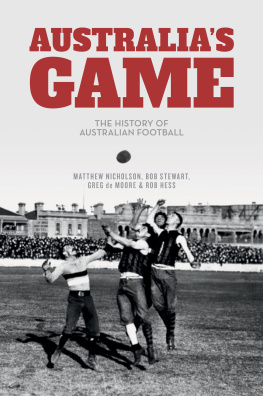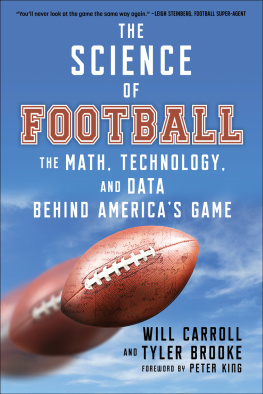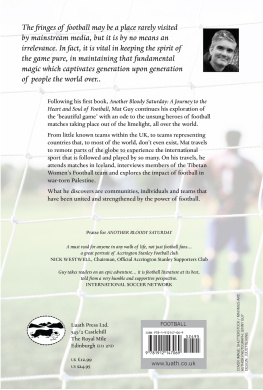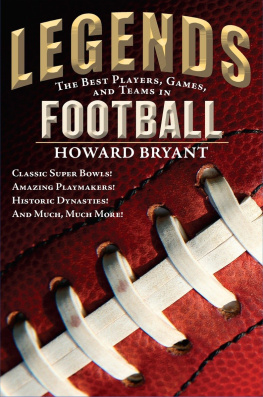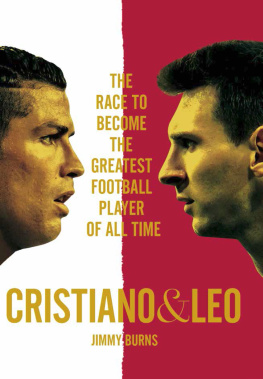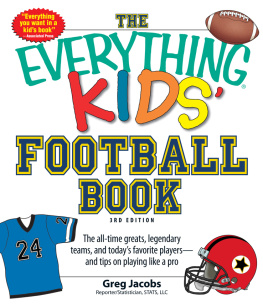Penguin supports copyright. Copyright fuels creativity, encourages diverse voices, promotes free speech, and creates a vibrant culture. Thank you for buying an authorized edition of this book and for complying with all copyright laws by not reproducing, scanning, or distributing any part of it in any form without permission. You are supporting writers and allowing Penguin to continue to publish books for every reader.
An application to register this book for cataloging has been submitted to the Library of Congress.
While the author has made every effort to provide accurate telephone numbers and Internet addresses at the time of publication, neither the author nor the publisher is responsible for errors, or for changes that occur after publication. Further, the publisher does not have any control over and does not assume any responsibility for author or third-party websites or their content.
In Latin America the border between soccer and politics is vague. There is a long list of governments that have fallen or been overthrown after the defeat of the national team.
Tell me how you play and I will tell you who you are.
Football is popular because stupidity is popular.
Whoever invented football should be worshipped as a god.
Poverty is good for nothing, except for football.
That Latin America is unique, because there exists no other Latin America except this one, does not mean that it is one, in the sense that there is unity. Disunion does not exclude identity. Neither does diversity.
ACKNOWLEDGMENTS
It is a strange paradox that one only learns how to write a book once it has been written. By then, it is usually too late. Fortunately, I have been able to rely on the wisdom and generosity of others for guidance. There are many who gave of their time and knowledge, and to whom I am indebted. Moreover, I am equally thankful to all those who took an interest, however fleetingly, in my attempt at an interpretation of the Latin American game. Any errors in this book are mine, and mine alone.
My first thanks go to my agent, Matthew Hamilton of Aitken Alexander Associates, and my publisher, Jon Riley at Quercus, both of whom saw early promise in this project. When I first suggested a book on Latin America football to Matthew, he replied, Great, now who can we get to write it? I dispensed with my publishers judgment and put myself forward. Matthew and Jon both encouraged, even when there seemed to be no end in sight. Thank you to my U.S. editor, Laura Perciasepe at Riverhead, who understood what I was trying to achieve and was ever patient as the clock ticked toward a tight deadline. And to Ricardo Sabanes, publisher at Club House in Buenos Aires; in the words of Gustavo Cerati, Gracias... totales!
I am especially grateful to Josh Ireland at Quercus, a prince among editors, without whose good counsel and smart judgment this project would never have made the finish line. My thanks also go to San Costello, for his swift copyediting, Emma Thawley, Flora McMichael, Corinna Zifko and everyone else at Quercus.
The idea for the book resulted from from an essay I was commissioned to writeon the image of Uruguay through Eduardo Galeanos workby the brilliant Ivor Indyk at Heat, the Australian literary magazine. A version of that essay appears as an introduction to this book. Thank you, Ivor.
Special thanks go to Jason Wilson, an academic in the very best sense, whose encyclopedic knowledge of the Ro de la Plata helped shape this book.
Outside Latin America, I would like to thank Olga Tom, Francisco Panizza, Carlos Aguirre, Richard Giulianotti, John Crace, Leo Hollis, Peter Parker, Nick Robinson, Pete Duncan, Charlotte Macdonald, David Wood, Ian Preece, Rick Gekoski, Peter Russell, Tom Pemberton.
In Latin America, I encountered a generosity of spirit that reflected the very best of a much-maligned continent. In Montevideo, my thanks go to my family, in particular Jorge Ciasullo, Martina Campomar, Pia Ciasullo, Jacqueline Campomar, Luis Campomar, Walter Lockhart. And also to Jorge da Silveira, Juan Carlos Luzuriaga, Gerardo Caetano, Rafael Bayce, Julio Mara Sanguinetti, Felipe Arocena, Alfredo Etchandy, Jorge Figueroa and Mario Romano.
In Buenos Aires: Federico Ciasullo, Julio Frydenberg, Carlos Yametti, Ezequiel Fernndez Moores, Pablo Alabarces, Roberto Di Giano, Rodrigo Daskal, Jos Garriga, Oscar Barnade, Ariel Scher, Vanesa Fernndez.
In Lima: Gerardo lvarez, Aldo Panfichi, Luis Arias Schreiber, Victor Vch, Sergio Markarin, Martn Benavides, Wilmer del guila Ochoa.
In Santiago: Konstantinos Simonidis, Danilo Daz, Jorge Iturriaga, Eduardo Santa Cruz, Sebastin Salinas, Edgardo Marn, Cristin Muoz.
In Mexico: Marcelo Assaf, Jos Samuel Martnez Lpez, Roger Magazine, Miguel ngel Lara, Carlos Caldern, Abraham Patinio.
In Brazil: Nacho Cerezo, Edgardo Martolio, Jos Renato Santiago, Jos Paulo Florenzano, Ricardo Weiss, Alvaro do Cabo, dison Gastaldo, Leonardo Affonso de Miranda Pereira, Felipe Soutinho, Michel Jamel.
In Asuncin: Jos Mara Troche.
I would also like to thank the staff and the resources at Biblioteca Nacional de Chile, Biblioteca Nacional de la Repblica Argentina, Biblioteca Nacional de Uruguay, British Library, British Newspaper Library, Senate House Library and Ibero-Amerikanisches Institut.
And last but not least, thank you to the wonderful Gina Rozner, without whose love, patience and support this book would never have been written. I cannot thank you and Broo (el super gato) enough.
COMO EL URUGUAY NO HAY
(Theres No Place Like Uruguay)
M y father and I are watching the last match of the 2010 World Cup that we will see together. Not for us the hyperbole of a World Cup final, for this is our final, Uruguays final: an essentially meaningless affair for third place.
Mira... mira como lleva la pelota. Look... just look at that ball control, my father says with approval, though I can detect a hint of malice in his voice that sounds more like justification.
Football is the passion that my father and I share. While we differ on so many issues, many of which further that gentle father-son antagonism, here we come together. We applaud the flashier, more articulate aspects of the game: a deft back-heel, a neat flick, the weighted pass and, of course, the art of dribbling. (My father especially approves of the audacity of dribbling in ones own penalty area, an approach much frowned upon by the ever-cautious

